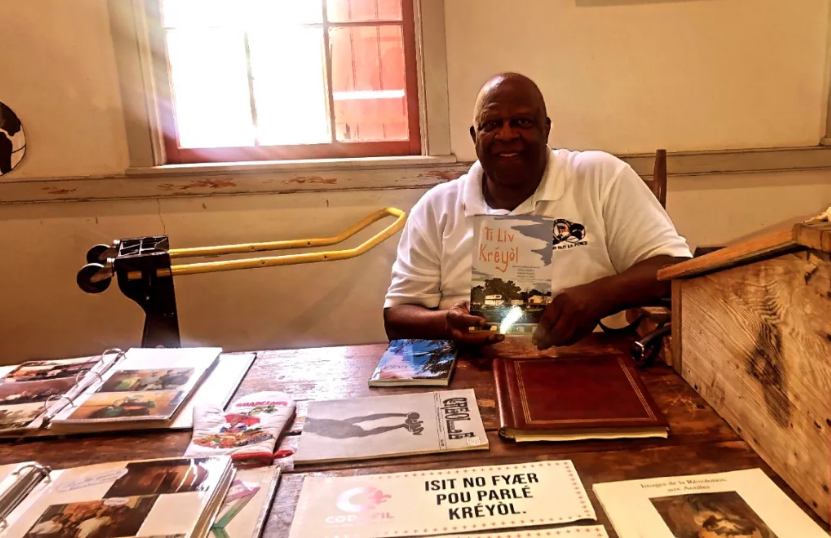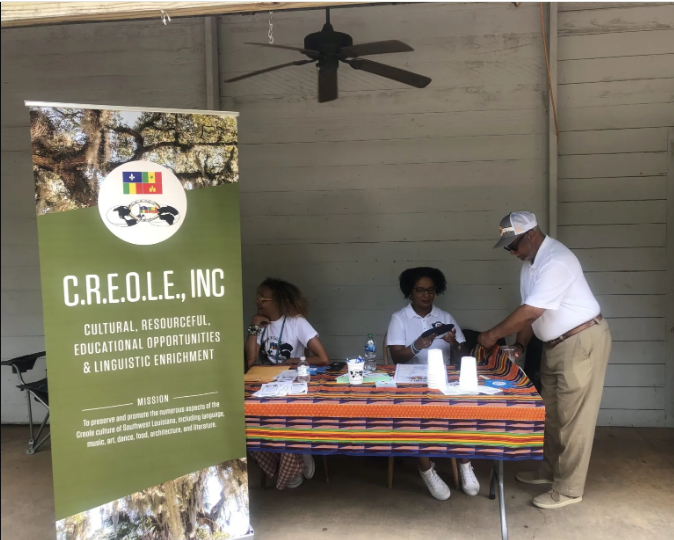The journey of reclaiming an endangered heritage language
by Quinn Foster, The Black Wall Street Times
Heritage languages mold the existence of the United States of America. According to Dr. Carreira, people speak over 350 languages other than English at home. And more than 67 million people speak a heritage language in the United States.
Louisiana Creole (Kouri-Vini) is a heritage language presumed native to Louisiana. The Creole language formed between the contact of European colonizers, the enslaved population, and Indigenous Peoples. Louisiana Creole continued to develop throughout the 1700s and beyond.
Enslaved Africans (born in Africa), enslaved Creoles (born in Colonial Louisiana), Free People of Color, Europeans, and some Native American tribes spoke and understood it. The Black Wall Street Times interviewed Misyé (Mr.) Herbert Wiltz about his upbringing as a native Louisiana Creole speaker and the collective efforts to revive the language.

Growing up in Southwest Louisiana
Wiltz grew up in a piti vilaj (small town) between Breaux Bridge and Parks, Louisiana. He vividly remembers hearing and understanding Creole from most of his relatives growing up. His mother moved to Houston, Texas, and because of his grandmother’s wishes, his grandparents raised him in Louisiana’s Creole culture.
Depending on the person, the name of the language may vary from Louisiana Creole (LC), Kouri-Vini (KV), Creole French, La-La, and others. Wiltz shared, “[My grandparents] mainly spoke Kouri-Vini, as I have come to know it to be. But it was always Creole, and I always said that we spoke the Creole language.”
Wiltz recalled how many children of sharecroppers in the Breaux Bridge area only speak Creole. He said, “The teacher, I’ll never forget her name, Mrs. Smith, she spoke Creole with them, and I understood everything that was being stated.”
The Louisiana Constitution of 1921 mandated public schools to teach solely in English. This did not stop local communities from speaking their heritage languages. Wiltz said, “Before school, we would speak Creole to one another while walking to school, on the playground during recess we spoke Creole, [sometimes at lunchtime], and then after school going back home, we spoke Creole to one another.”
His first love was music. Wiltz attended Holy Rosary Institute and was a part of the school’s first official band. But language followed him, “With the powers to be, I think language just chose me,” he said.
Wiltz received scholarships in French and Spanish from Southern University. He eventually taught French at the elementary and middle schools in Lafayette Parish.
In 2020, La Table Kreyol (The Creole Table) came about from the support of Wiltz, NUNU Arts & Culture Collective, and the need for a linguistic roundtable to support the first edition of Ti Liv Kréyòl (Little Creole Book).
He said, “I was astounded that a number of folks heard about the table, and these were people from around the world. We talking ‘bout Paris, France . . . French Guiana, Canada, and all parts of the United States.”
Louisiana Creolophones are reclaiming their heritage language
Organizations and groups like C.R.E.O.L.E. INC., Council of the Development of French in Louisiana (CODOFIL), CHINBO, Louisiana Creole/Kouri-Vini Practice Facebook Group, and others are actively preserving Louisiana’s heritage languages.
Longtime Creole journalist and publisher, Ruth Foote, co-founded Creole Magazine.
Wiltz shared, “I wrote for a magazine that was entitled Creole Magazine and I wrote lessons as to what [LC] might look like and that was based on some of the Haitian Creole. And so we refined it with the help of Christophe Landry who developed the lettering and alphabet for Kouri-Vini, Adrien Guillory, Cliford St. Laurent, Jonathan Mayers, and Oliver Mayeux.”
This was not always the case. In fact, the historical demonization and racialization of the language are shown in the anthology book, “Creoles of Color of the Gulf South.” In one of the articles, Albert Valdman wrote, “The devalorization of Louisiana Creole, [is] reflected by the pejorative terms that even some of its speakers use to refer to it–n*g, française n*g, N*gger French, [Kouri-Vini], etc.–it stems in large part from its association with slavery.”
Younger Louisiana Creoles are taking ownership and pride in their language within the digital realm.
According to a Language Documentation and Description journal article, Oliver Mayeux discusses language revitalization through social media. With digital technology, Louisiana Creolophones are connecting the language with younger generations.
Mayeux said, “The language has received little to no support from the state government and has been neglected in the region’s few language policy and planning efforts focused on French. Meanwhile, the Louisiana Creole Virtual Classroom has attracted hundreds of learners, some of whom have acquired the language to fluency without ever having interacted face-to-face with other speakers.”
Unfortunately, Louisiana’s heritage language initiatives face ongoing challenges. Residents can contact and ask their state senator to continue to support funding for Télé-Louisiane French programming on Louisiana Public Broadcasting. Télé-Louisiane also produces Louisiana Creole content.
What’s next for Kouri-Vini?
Due to Orthographers and enthusiasts like Wiltz, Dr. Landry, Cliford St. Laurent, and others, the written component of Louisiana Creole is expanding.
The next step is to get Kouri-Vini into Louisiana’s public school system. Wiltz said, “We want to continue the dialogue that we’ve started as far as implementing this into schools and various other programs that exist.”
He also expressed the importance of young Creole and Zydeco music artists fully inputting the Creole language into their music. “If they want to learn then we are here to teach, but we need those youngsters who are also doing the same thing to not just play music in English, but to learn those lyrics in Creole and also write them,” Wiltz said.
To learn more about Louisiana’s heritage languages, visit Vermilionville on June 9 for the 22nd annual Créole Culture Day. In addition, La Table Kreyol at NUNU is every second Saturday of the month. Parks hosts a Creole table every fourth Saturday of the month at the Village of Parks Library. Wiltz will also have an 8-week session KV class starting on August 10.
Lastly, Cliford St. Laurent and Alliance Française de Lafayette (French Alliance of Lafayette) offer separate classes.
Kouri-Vini is still alive because of community members, culture bearers, and linguistic bearers.
Wiltz strongly believes that learning Louisiana Creole will bridge generational gaps between grandparents, parents, and their children. He said, “It’s not just knowing the language, but you’re also understanding the culture which it exists in, so there’s a relationship that we form there.”













